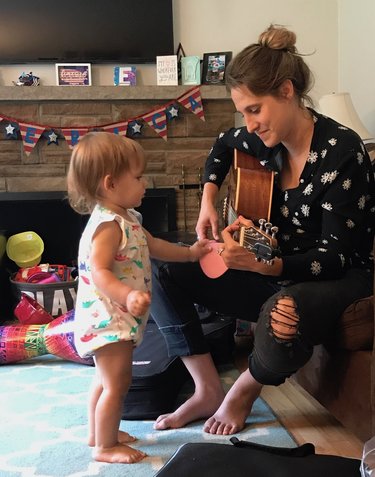Expressive Journeys: Music therapy feels like fun, not work
— Photo from Erin Lancraft
Teaching music early: Erin Lancraft has for years gone to clients, but recently opened a music therapy clinic in Guilderland. Here she works with a very young client, Lancraft explained, at the girl’s home. They worked, she said, on gross motor skills and creating a musical relationship through the use of a large guitar pick and using a preferred song to engage the girl.
GUILDERLAND — Erin Lancraft has loved music since she was a young girl. She also started volunteering at a summer camp for children with developmental disabilities when she was 11, and continued to work there through high school.
She is 35 now and has combined those two early passions into a business called Expressive Journeys.
“I fell in love with the kids,” she said. “They really loved singing and music experiences.”
When she was in high school and first heard about music therapy as a possible career choice, she knew it would combine her two loves.
Expressive Journeys, at 10 New Karner Road, offers music therapy, music lessons, and drop-in classes for people of all ages, said Lancraft this week.
Lancraft, a board-certified music therapist, started her business a decade ago and now has eight employees. Becoming a music therapist requires at least a bachelor’s degree in music therapy as well as 1,200 hours of clinical training. She and her staff currently also travel to about 15 school districts within the Capital District and beyond.
This is her first time owning a brick-and-mortar clinic, she said. She wanted to have a place for people from the community to gather, in addition to bringing music to clients at their schools or homes.
“Active engagement in music-making requires both hemispheres of the brain to work together and helps create new neural pathways,” Lancraft said.
Her clients include people with developmental disabilities, individuals recovering from a stroke or injury, and people who are neurotypical. She helps people all along the age spectrum from those nearing the end of their lives to drop-in classes with babies that can help little ones to develop motor skills and a love of music, she said.
Music-therapy sessions can help people express themselves, regulate their emotions, develop fine and gross motor skills, increase self-esteem, and improve their quality of life, Lancraft said.
It accomplishes all of that in a setting that feels like fun, and not work.
Additional staff at the clinic also offer yoga, meditation and mindfulness, and reiki treatments.
